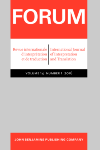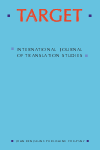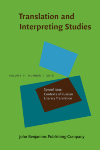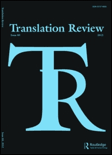
Linguistica Antverpiensia New Series-Themes in Translation Studies
Scope & Guideline
Innovating the Future of Translation Studies
Introduction
Aims and Scopes
- Interdisciplinary Approaches to Translation:
The journal emphasizes research that bridges translation with various disciplines such as linguistics, cultural studies, and technology, promoting a comprehensive understanding of translation's role in society. - Impact of Technology on Translation Practices:
A core focus is on how emerging technologies, particularly machine translation and automation, influence traditional translation and interpreting practices, including educational implications. - Cultural and Emotional Dimensions of Translation:
Research addressing the translatability of emotions and cultural nuances highlights the journal's commitment to exploring the subjective and cultural dimensions of translation. - Quality Assessment and Professional Practices:
The journal includes studies that evaluate translation quality and the perceptions of translators, thereby contributing to professional standards and practices in the field. - Historical and Sociopolitical Contexts of Translation:
Papers often explore historical and sociopolitical contexts that influence translation movements and practices, contributing to a deeper understanding of translation's impact on society.
Trending and Emerging
- Machine Translation and Automation:
Research on machine translation, particularly its application in audiovisual translation and educational settings, has surged, indicating a growing interest in the implications of automation for the profession. - Intercultural Communication in Crisis Contexts:
Emerging studies on intercultural communication during local crises highlight the importance of translation in global health and humanitarian contexts, showcasing its relevance in real-world applications. - Gender and Translation:
The exploration of gender perspectives in translation studies has gained traction, emphasizing the need for inclusive discussions that address diverse voices and narratives. - Quality Assessment in Translation Technology:
The focus on assessing the quality of machine-generated translations and post-editing practices reflects an increasing concern for maintaining professional standards in the face of technological advancements. - Transnational Perspectives in Translation:
Research that considers transnational movements and their impact on translation practices is on the rise, indicating a shift towards understanding translation in a globalized context.
Declining or Waning
- Traditional Literary Translation:
Research focused solely on traditional literary translation practices appears to be waning, as the journal shifts towards more interdisciplinary and technology-driven studies. - Static Theories of Translation:
There is a noticeable decline in papers centered around static or prescriptive theories of translation, with the journal favoring more dynamic and contextual approaches. - Local Community Translation Practices:
Although still relevant, the emphasis on local community translation practices has decreased, possibly overshadowed by broader discussions on technology and globalization.
Similar Journals

Cadernos de Traducao
Fostering dialogue in Language, Linguistics, and Literature.Cadernos de Tradução, published by the Universidade Federal de Santa Catarina, is an esteemed open-access journal dedicated to fostering scholarship in the fields of Language, Linguistics, and Literature. Since its inception in 1996, this journal has emerged as a vital platform for research, particularly known for its rigorous peer-review process and commitment to academic excellence. With a Q2 ranking in Linguistics and Language and a Q1 ranking in Literature and Literary Theory as of 2023, it stands out in the global academic landscape, holding significant positions in Scopus rankings across various categories. Researchers, professionals, and students will find a wealth of interdisciplinary studies that contribute to current discussions and advancements in translation theory and practice. The journal's open-access model enhances visibility, ensuring that groundbreaking research is accessible to a wide audience, thus promoting dialogue and collaboration within the international academic community.

REVISTA DE FILOLOGIA DE LA UNIVERSIDAD DE LA LAGUNA
Cultivating knowledge and dialogue in the realm of philology.REVISTA DE FILOLOGIA DE LA UNIVERSIDAD DE LA LAGUNA is a prestigious academic journal dedicated to advancing the fields of linguistics and language studies. Published by the Universidad de la Laguna in Spain, this journal serves as an essential resource for researchers, professionals, and students alike, offering critical insights and scholarly articles that contribute to the understanding of language and its intricacies. With its inclusion in the Q3 category of the 2023 Linguistics and Language rankings and Scopus rankings, it demonstrates a growing impact within the academic community, while maintaining a commitment to fostering dialogue and disseminating valuable research. As a platform for innovative ideas and diverse perspectives, the journal aims to bridge theoretical approaches and practical applications, ensuring that readers are well-equipped to engage with contemporary issues in linguistics. Although it is currently not open access, the journal remains an influential contributor to the language and linguistics sectors, operating from the picturesque Canary Islands, enhancing its appeal not only as a scholarly resource but also as a culturally rich platform for academic expression.

Forum-Revue Internationale d Interpretation et de Traduction-International Journal of Interpretation and Translation
Fostering Interdisciplinary Dialogue in Linguistics.Forum-Revue Internationale d’Interprétation et de Traduction - International Journal of Interpretation and Translation is a prestigious peer-reviewed journal published by John Benjamins Publishing Co, renowned for its contributions to the fields of linguistics and literary theory. With an ISSN of 1598-7647 and an E-ISSN of 2451-909X, this journal provides a vital platform for researchers, professionals, and students to disseminate and engage with innovative research findings and theoretical developments in interpretation and translation studies. As of 2023, it holds a respectable Q3 ranking in Linguistics and Language and a Q2 in Literature and Literary Theory, underscoring its growing influence within academia, reflected by its Scopus rankings. The journal encompasses a diverse array of perspectives and methodologies to enhance the understanding of translation practices and their implications in contemporary society. Although the journal operates within a limited open access framework, its commitment to high-quality scholarship makes it an essential resource for those seeking to contribute to and stay abreast of advancements in this dynamic field. Established to foster interdisciplinary dialogue, the journal invites submission from a wide range of scholarly approaches and encourages collaborative discourse among linguists, translators, and literary theorists.

Cuadernos de Linguistica Hispanica
Advancing Hispanic Linguistics for a Global AudienceCuadernos de Linguistica Hispanica is a distinguished open access journal published by UNIV PEDAGOGICA & TECNOLOGICA COLOMBIA, dedicated to advancing research in the field of linguistics and language studies since its inception. With an ISSN of 0121-053X and E-ISSN 2346-1829, this journal has established itself as an important platform for scholars to share innovative findings and insights within the linguistics community. As a Q3-ranked journal in linguistics and language according to 2023 category quartiles, it occupies a significant position in Scopus rankings, showcasing its commitment to quality and relevance. With the aim to foster scholarly discourse and promote understanding of the Hispanic linguistic landscape, the journal welcomes contributions that explore a diverse range of topics and methodologies. The journal has embraced open access since 2008, ensuring that research is accessible to a broader audience, thus enhancing its impact and engagement within both academic and professional spheres.

LFE-Revista de Lenguas para Fines Especificos
Advancing Language Education for Specific PurposesLFE-Revista de Lenguas para Fines Especificos is a distinguished academic journal focused on the field of applied linguistics and language education, published by UNIV LAS PALMAS GRAN CANARIA, SERV PUBL & DIF CIENT PARQUE CIENT. Established in 1993, this Open Access journal promotes the dissemination of research on specific purposes in language studies, making it an invaluable resource for researchers, educators, and students alike. Based in Spain, it serves an international audience interested in the intersection of language acquisition, pedagogy, and professional communication. Despite its recent entry into Scopus with competitive rankings in Social Sciences, particularly in Linguistics and Language and Education, the journal aims to continually enhance its impact by inviting innovative contributions that explore contemporary challenges and methodologies in language teaching and learning. Researchers are encouraged to tap into this growing repository of knowledge, which is easily accessible to foster collaborative and interdisciplinary dialogues within the field.

Target-International Journal of Translation Studies
Bridging Gaps in Global CommunicationTarget - International Journal of Translation Studies, published by John Benjamins Publishing Co, stands as a leading academic forum in the fields of translation studies, communication, and linguistics. Established in 1989, this prestigious journal has successfully evolved, boasting a Q1 classification in 2023 within both Communication and Linguistics and Language categories, reflecting its significant impact and influence in these disciplines. With an impressive positioning in the Scopus ranks, it is recognized as one of the top journals in its field, being placed in the 88th percentile for Language and Linguistics, and in the 87th percentile for Linguistics and Language within the Social Sciences. Its rigorous scholarly contributions foster a greater understanding of translation practices, theories, and methodologies, making it an essential resource for researchers, professionals, and students alike. While it does not currently offer open access, its comprehensive articles and studies greatly enrich discussions and advancements in translation and communication studies.

Translation and Interpreting Studies
Advancing Knowledge in Translation and Interpreting Studies.Translation and Interpreting Studies is a prestigious academic journal published by John Benjamins Publishing Co, focused on the dynamic fields of translation and interpreting. Established in 2011, this journal has rapidly ascended to become a leading platform in its domain, achieving Q1 quartile status in Linguistics, Language, and Literature categories as of 2023. With an impressive ranking of #16 out of 1106 in Arts and Humanities for Literature and Literary Theory, and #182 out of 1088 in Language and Linguistics, it is recognized for its significant contributions to scholarly discourse. Although not fully open-access, the journal provides essential insights and research findings for linguists, translators, interpreters, and students, fostering a greater understanding of the theoretical and practical implications of translation studies. Situated in the Netherlands, it plays a vital role in the global academic community, bridging gaps between theory and practice, and ensuring that cutting-edge research is readily accessible to professionals and scholars alike.

Quaderns-Revista de Traduccio
Navigating the Landscape of Translation and LanguageQuaderns-Revista de Traduccio, published by the Universitat Autònoma de Barcelona, is a prominent journal in the field of Linguistics and Language, which has garnered recognition for its scholarly contributions since its inception. With an ISSN of 1138-5790 and an E-ISSN of 2014-9735, this journal has maintained an active publication schedule across notable cycles, contributing valuable insights from 2011 to 2018 and continuing from 2020 to 2024. As a Q3 category journal in both Arts and Humanities and Social Sciences related to Language and Linguistics, it occupies an important niche, ranking #607 out of 1088 and #692 out of 1167 respectively. Though currently not an open-access journal, its rigorous peer-review process ensures that published articles meet high academic standards, making them relevant for researchers, professionals, and students alike. Housed in Cerdanyola del Vallès, Barcelona, this journal serves as a critical platform for the dissemination of cutting-edge translation studies and linguistics research.

TRANSLATION REVIEW
Exploring New Horizons in Translation Studies.TRANSLATION REVIEW is an esteemed academic journal dedicated to advancing the field of translation studies, encompassing critical analysis and theoretical explorations that inform contemporary practices in linguistics and literature. Published by Routledge Journals, Taylor & Francis Ltd, this journal has earned a respectable reputation within the scholarly community, evident from its current categorization in the Q3 quartile in Linguistics and Language and Q2 in Literature and Literary Theory. With issues spanning from 1978 to the present, TRANSLATION REVIEW reflects a rich legacy of scholarly discourse while also engaging with emerging trends in translation theory and pedagogy. The journal's Scopus rankings place it within the top 30% percentile of Arts and Humanities research, providing a significant platform for researchers and professionals to disseminate their findings. As a non-open access journal based in the United Kingdom, it welcomes contributions that offer new insights and foster dialogue around translation's multifaceted impact in a global context. Scholars, practitioners, and advanced students will find this journal an invaluable resource for both theoretical frameworks and practical applications in translation studies.

Interpreter and Translator Trainer
Shaping the Future of Interpreter and Translator TrainingInterpreter and Translator Trainer, published by Routledge Journals, Taylor & Francis Ltd, is an esteemed academic journal dedicated to the fields of education, linguistics, and translation studies. With an ISSN of 1750-399X and E-ISSN 1757-0417, this journal has established itself as a leading platform for scholarly discourse and innovative research since its inception in 2007. Housed in the United Kingdom, it is recognized for its high academic standards, evidenced by its Q1 rankings in both Education and Linguistics for 2023. The journal explores significant developments in interpreter and translator training, providing a vital resource for researchers, educators, and practitioners striving to enhance their pedagogical frameworks and methodologies. With its impressive Scopus rankings reflecting a strong impact in the arts, humanities, and social sciences, Interpreter and Translator Trainer serves as an essential publication for those committed to advancing the understanding and practice of translation and interpreter education. The journal remains accessible via traditional subscription models, inviting contributions that push the boundaries of research and teaching in these interconnected fields.